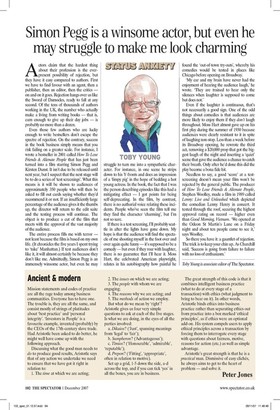Simon Pegg is a winsome actor, but even he may struggle to make me look charming
TOBY YOUNG Actors claim that the hardest thing about their profession is the everpresent possibility of rejection, but they have it easy compared to authors. First we have to find favour with an agent, then a publisher, then an editor, then the critics — on and on it goes. Rejection hangs over us like the Sword of Damocles, ready to fall at any second. Of the tens of thousands of authors working in the UK, the number who actually make a living from writing books — that is, earn enough to give up their day jobs — is probably no more than a dozen.
Even those few authors who are lucky enough to write bestsellers don't escape the spectre of rejection. On the contrary, success in the book business simply means that you risk failing on a greater scale. For instance, I wrote a bestseller in 2001 called How To Lose Friends & Alienate People that has just been turned into a film starring Simon Pegg and Kirsten Dunst. It isn't due to be released until next year, but I suspect that the next stage will be to do a series of 'test screenings' What this means is it will be shown to audiences of approximately 350 people who will then be asked to fill out cards saying whether they'd recommend it or not. If an insufficiently large percentage of the audience gives it the thumbs up, the director will return to the edit suite and the testing process will continue. The object is to produce a cut of the film that meets with the approval of the vast majority of the audience.
The entire process fills me with terror — not least because the film is based on my own life. (It chronicles the five years I spent trying to 'take' Manhattan.) If test audiences don't like it, it will almost certainly be because they don't like me. Admittedly, Simon Pegg is an immensely winsome actor, but even he may struggle to turn me into a sympathetic character. For instance, in one scene he strips down to his Y-fronts and does an impression of a limpy pig' in the hope of bedding a hot young actress. In the book, the fact that I was the person describing episodes like this had a mitigating effect — I got points for being self-deprecating. In the film, by contrast, there is no authorial voice relating these incidents. People who've seen the film tell me they find the character 'charming', but I'm not so sure.
If there is a test screening, I'll probably scuttle in after the lights have gone down. My hope is that the audience will find the spectacle of me shooting myself in the foot over and over again quite funny — it's supposed to be a comedy — but even if they roar with laughter, there is no guarantee that I'll hear it. Moss Hart, the celebrated American playwright, relates in his autobiography how painful he found the 'out-of-town try-outs', whereby his comedies would be tested in places like Chicago before opening on Broadway.
'My ear and my brain have never had the enjoyment of hearing the audience laugh,' he wrote. 'They are trained to hear only the silences when laughter is supposed to come but does not.'
Even if the laughter is continuous, that's not necessarily a good sign. One of the odd things about comedies is that audiences are more likely to enjoy them if they don't laugh throughout. Moss Hart almost gave up on his first play during the summer of 1930 because audiences were clearly resistant to it in spite of laughing non-stop. Less than a week before its Broadway opening, he rewrote the third act, removing a $20,000 prop that got the biggest laugh of the night and inserting a 'quiet' scene that gave the audience a chance to catch their breath. Only after he'd done this did the play become a bona fide hit.
Needless to say, a good 'score' at a testscreening doesn't mean your film won't be rejected by the general public. The producer of How To Lose Friends & Alienate People, Stephen Woolley, made a film in 1989 called Lenny: Live and Unleashed which depicted the comedian Lenny Henry in concert. It tested through the roof, securing the highest approval rating on record — higher even than Good Morning Vietnam. 'We opened at the Odeon St Martin's Lane on a Friday night and about ten people came to see it,' says Woolley.
So there you have it: a gauntlet of rejection. The trick is to keep your chin up. As Churchill said, 'Success is going from failure to failure with no loss of enthusiasm.'
Toby Young is associate editor of The Spectator.





































































 Previous page
Previous page